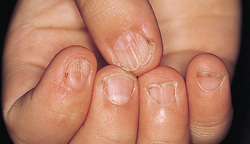 While eating a well-balanced, whole foods diet is essential for disease prevention and the maintenance of health is it enough if you are deficient in key vitamins and minerals? What are the signs and symptoms of deficiencies the you can observe our your body? The following is quick guide to signs that may suggest deficiency in certain nutrients. Remember these are just signs and can vary in different people. Each sign can often mean multiple things that aren’t necessarily related to a deficiency. This should not replace proper medical examination and laboratory testing. Head Thin, dry hair: low thyroid function or essential fat acid deficiency Hair loss: zinc deficiency Dandruff: zinc and essential fatty acid deficiency Noise sensitivity: Magnesium deficiency Excess earwax: fat deficiency Face Dry, cracked lips: B-vitamin deficiency Tingling lips: calcium or vitamin D deficiency (also consider a herpes infection) Pale under eyelids: anemia Blood vessels visible around nose and cheeks: gastric (hydrochloric) acid deficiency Goiter/swollen thyroid: Iodine deficiency (now very uncommon in North America) Loss of smell: zinc deficiency Light sensitivity: B2 deficiency Eye twitches: Magnesium deficiency Mouth Bright purple/red tongue: vitamin B2, B3 or B12 deficiency Loss of taste: zinc deficiency Spongy gums and loose teeth: vitamin C deficiency Hoarse voice: iron deficiency (also consider low thyroid function) Body Easy bruising: iron, vitamin K or vitamin C deficiency Tingling in hands (carpal tunnel): B6 deficiency White specks in nails: zinc deficiency Ridges in nails (longitudinal): gastric (hydrochloric) acid deficiency Brittle nails: zinc and sulfur deficiency Frequent muscle cramps: magnesium and potassium deficiency Red palms: B-vitamin deficiency Pale skin: iron deficiency anemia Note: This list is NOT meant to diagnosis medical conditions. Please see you licensed healthcare practitioner with any concerns.
1 Comment
 We live in a world of calorie dense but nutrient poor foods. Do to over farming and poor agricultural practices many vegetables, fruits and grains have lower amounts of minerals and vitamins then they had in the past. While the trend is moving toward organic and whole food options the question is can a healthy diet still provide enough nutrients and vitamins to meet our daily needs? Most experts agree that a well rounded, plant based, whole foods diet is more then adequate to meet the needs of most healthy people but what about if you are deficient in a particular nutrient? Is diet enough to correct it? What’s the difference between measurable and functional (the optimum a your body needs to function) deficiency? Clinical experience among Naturopathic doctors suggests for people with deficiencies extra supplements are needed to restore adequate levels. A good way to look at this is while a balanced diet is great for maintenance of nutrient status but if you have a health condition you are in a “health rut” and you need a little extra help to get out. This is where extra minerals and vitamins can be very useful. The following are a few conditions or situations where deficiencies of minerals or vitamins can play a role in the disease process. Adequately replacing these essential nutrients may help reverse the conditions. High blood pressure: Magnesium plays a key role in blood vessel relaxation. Low levels lead to constricted blood vessels and increased pressure. Chronic magnesium deficiency also allows calcium to build up in the lining of the vessels creating constriction and hardening. Depression: Zinc, magnesium, vitamin B6 and B3 are all essential for the formation of the “feel good” neurotransmitter serotonin. Deficiencies in the above nutrients can lead to poor production of serotonin and melatonin decreasing mood and impairing sleep. Unfortunately, anti-depressant drugs don’t address this root cause since they don’t increase production of serotonin but only keep it in the brain longer. Hypothyroidism: Most people have heard of iodine being essential to thyroid hormone production but selenium and zinc are also required in this process. Selenium is especially important since it is required for the conversion of T4 to T3 (the active form of thyroid hormone) in the liver and peripheral tissues. Additionally it also reduces autoimmunity against the thyroid gland (Hashimoto’s thyroiditis). Acne: Zinc plays an essential anti-inflammatory role by stabilizing the immune system. When levels are low people may be predisposed to more acne outbreaks and increased severity. It’s important to note that copper should always be supplemented along with zinc since long-term zinc use can lead to a copper deficiency. Fibromyalgia: Magnesium is a key factor in muscle function and some research shows that people with fibromyalgia have low intracellular magnesium levels despite blood levels being normal. The combination of magnesium and malic acid has been shown to have a positive effect on symptoms. Restless legs syndrome (RLS): Iron is an often-overlooked mineral in RLS. It is required for the formation of dopamine in the brain, which regulates muscle movement. Before supplementing be sure to get your ferritin levels checked to see if you are iron deficient. References Altura et al. Magnesium deficiency upregulates sphingomyelinases in cardiovascular tissues and cells: cross-talk among proto-oncogenes, Mg(2+), NF-κB and ceramide and their potential relationships to resistant hypertension, atherogenesis and cardiac failure. Int J Clin Exp Med. 2013 Oct 25;6(10):861-79. Moorkens et al. Magnesium deficit in a sample of the Belgian population presenting with chronic fatigue. Magnes Res. 1997 Dec;10(4):329-37.  There has been a tremendous amount of research done on aging and longevity. It is been long known that caloric restriction has a positive effect on longevity. However one of the latest discoveries is that fasting could actually dramatically reduce the risk of cancer, diabetes, alzheimer's disease and cardiovascular disease. The evidence is showing that short term caloric restriction (2-4 days) has multiple favourable effects on our physiology. When it comes to cancer a number of studies have shown that fasting improves the effectiveness of chemo therapy and radiation. It seem like this effect is linked to caloric restriction reducing IGF-1, a growth hormone secreted by our body to promote cell multiplication. In fasting, IGF-1 goes down and instead of growing, cells focus on repairing and re-building themselves. This offers a protective effect to healthy cells and may inhibit the spread and growth of cancer cells. Interestingly, high protein intake is one of the most potent stimulators of IGF-1 production in the liver. Many of the most popular "healthy" diets are plant-based and low in processed foods. Specific anti-cancer diets like the ones outlined in the China Study by Dr Colin T Campbell and the Gerson diet are low protein, vegetarian diets. These diets tend to be lower in calories and animal meats but higher in nutrients so they inherently will decrease IGF-1 production. It seems like the bottom line is that eating less calories, especially animal meats and refined sugars, will have a positive effect on any disease process. If you think fasting for 3 days is to difficult, intermittent fasting is another option where you eat normally for 5 days and then eat 600cal for 2 days/week. Preliminary evidence shows that this approach harnesses the beneficial effects of fasting without the extended restrictive periods. I recommend that you see a a health care practitioner before you try fasting since there are some cases it may not be right for you and could be harmful. If you have cancer, then you should have a consult with a ND that has experience in this field. Watch this video for a great overview http://www.dailymotion.com/video/xvdbtt_eat-fast-live-longer-hd_shortfilms References: Longo and Fontana. Calorie restriction and cancer prevention: metabolic and molecular mechanisms Trends Pharmacol Sci. 2010 February ; 31(2): 89–98. doi:10.1016/j.tips.2009.11.004 |
Welcome To My Blog
My goal is to post thought-provoking and informative articles so you can learn and apply the latest news from the world of natural health. Feel free to post comments and start a conversation. Stay tuned to my twitter and facebook feeds for the latest posts.
Archives
December 2015
|

 RSS Feed
RSS Feed

